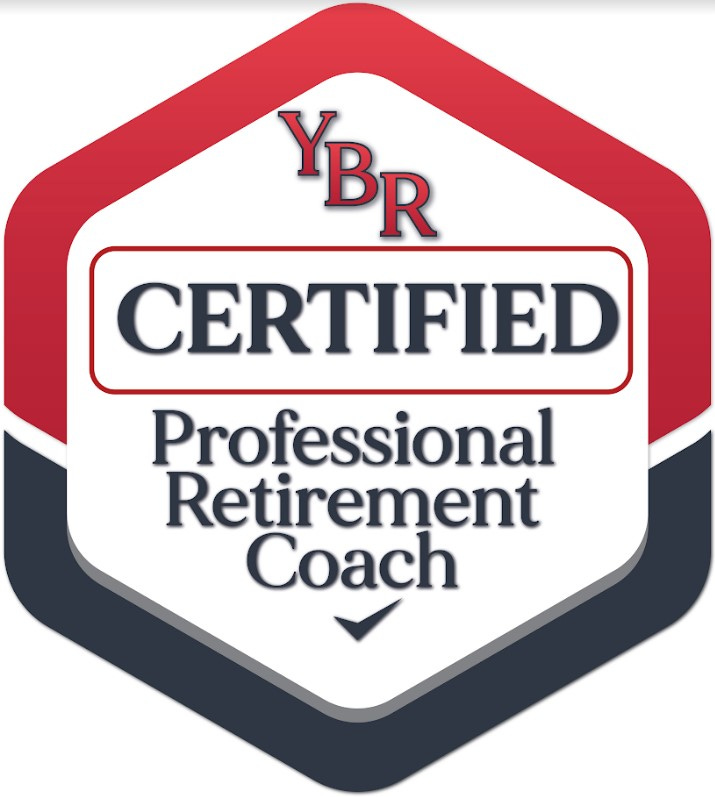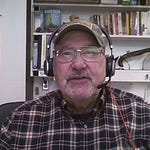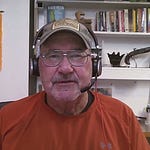Transcript
Coach: Welcome to this episode of Your Best Retirement. I'm Coach Ledford, and today we're going to tag up on a few of the concepts that we've shared in earlier podcasts. We're going to spice it up a little bit by making you think about some new things.
Today, I'm joined by my friend and colleague, Curt Ghormley. How are you doing today, Curt?
Curt: So far, I'm doing just fine. We'll see how this take goes. Go ahead.
Coach: That's right. You know, Curt, one thing we've established for sure is that we're going to live longer. In fact, it's likely that we're going to live 25 years longer—that's a quarter of a century longer than our great-grandparents. Now, with all that extra time, what are we going to do to leave a legacy that is enviable and inspirational for other people?
You know, Curt, this all begins with a thing called the retirement honeymoon. I wanted you to come on today because you had a particularly interesting story about your retirement honeymoon. Go ahead and share that with the folks, would you?
Curt’s Alaska story
Curt: So, Coach, it's not exactly a retirement story, but it is evidence of this retirement honeymoon that we all approach when we reach that transition. Several years ago, my wife and I, being great lovers of the outdoors, were approached by a couple of other families in the area we know who wanted to go on a cruise to Alaska.
There were four other couples and us who joined a larger church group from Wichita. We plied the inside passage on a big cruise ship from Seattle to Juneau and back. It was seven days long.
Now, I was really looking forward to it with great anticipation. Never been on the ocean before. This will be great.
I have to tell you, by the afternoon of the second day, I was bored. I thought another turn around the deck, sit in the chaise lounge, read another chapter from the book, eat all day long, and wait to be entertained in the evening. I thought, surely with the amount of booze that we are consuming, there is some cargo down below decks that needs to be shifted. They probably won't let me run the forklift. Maybe I could just take the clipboard and check things off.
But I was determined to be happy and to act happy for the rest of that week. Back to you, Coach.
Coach: Great story, Curt. In fact, folks, many of us, like Curt, after we're done with the retirement honeymoon phase, have this gnawing feeling inside of us that something's missing. We've all realized by now that the paycheck's missing—that's one thing.
But more importantly, the psychological income that came when we were at work and raising our kids is now gone. We've actually transitioned to a new phase.
The PERMA model
You know, the principles that served us so well during our working years need to be reignited. We need to re-employ those principles in order to have your best retirement.
The principles are called PERMA. It stands for:
positive emotion,
engagement,
relationships,
meaning, and
accomplishment.
How are we going to do that now that we've got another 25 years more than our predecessors to live? In our fall workshop, we're going to help you learn how to do this. Curt has a great story today to tell about how he made the transition from a very highly respected professional job to living his best retirement. Go ahead, Curt.
How Curt made the transition
Curt: Coach, I was in a major corporation, a Fortune 50 organization, for 36 years. In the last decade that I was there, I spent as a national sales manager in a very highly technical arena for which I was not exactly qualified, but the job fell to me.
I was always surprised, as a farm boy from my origins, that people actually listened to my opinion at that level. I joined a conference call, and people wanted to hear what I had to say, or at least they said they wanted to hear what I had to say. I was in a very fast-paced environment.
I retired finally on a Monday, and on a Tuesday morning, the next day, I started delivering my first load of firewood.
I had purchased a small retail firewood business from a guy that I know. I joined the faceless ranks of the blue-collar people who invade upscale neighborhoods every morning and vacate every afternoon before the principals get home.
No more high-level living, no more first-class upgrades, no more tense conference calls with high-paid lawyers negotiating multimillion-dollar contracts. Now it was just me, a pickup, a load of firewood, and a wheelbarrow.
A beautiful stack of oak firewood
I learned to free stack firewood. This was kind of fun. I'd take oak and stack it without using a rack, stack four feet high and eight feet long, making it very stable and safe. It's a thing of art, really, in its own way.
There was a customer I had who owned several car dealerships, and he ordered one of those free stacks for his patio party he was going to have. I got it built for him, and he looked at it and said, "Wow, that's really beautiful."
I said, "Of course it is!" He said, "I was going to burn some of this in my fire pit, but I hate to disturb the looks of it."
I said, "Oh, don't burn that. If you want to burn something in the fire pit, I'll bring you some old stuff to burn. But I'd put a couple of planks on that and serve your cocktails for your patio party."
It was great. I lost respect at work, but I got it back from about 200 new customers that I had. In many ways, it was more fulfilling than what I had seen from my career job. Because now this was all me. It was not the big corporation standing behind me. Back to you, Coach.
Coach: Yeah, and besides that, you no longer get your bags checked for free, do you?
Curt: There are some downsides. I'll give you that.
Coach: What has happened here is Curt has made the change to retirement as well as the transition to retirement.
Change vs transition
You know, change is external. It's somewhat predictable. We sort of know when the kids are going to get out of school. We sort of know when we're going to retire. We sort of know the feeling when it's time to start downsizing our house.
But transition, on the other hand, is an internal process. It doesn't go on an even flow. You go up sometimes and back a little bit more. But the whole idea is that you are enlarging your identity. You're embracing and enriching your legacy, and that's what YBR is here to help you do. It's to help you codify exactly how and why you're going to do that.
In fact, it brings us back to today's title, which is "What You Hope For Is What You're Living For."
First of all, I have to give kudos to my pastor, Pastor D, for coming up with this pithy title. What we want you to do is tell us in one sentence what it is you hope for and how you're going to live for it, because that is indeed what's happening now at this phase of the game.
You've done this many times in previous quarters of your life—when you did it at work, during your career, when you got married, and when you raised your family. But I want to share my story. It's not probably as good as the firewood story, but—
The Coach’s basketball aspirations
“What I hope for and what I live for” was to become a basketball player, to be on the basketball team. Now, there's many followers here who remember me from school days, and they're laughing right now because they realize the tremendous extent I went to to identify with that.
When I was in school, every decision I made wasn't by answering the question, "What would Jesus do?" which is probably what I should have asked. But more importantly, I asked myself, "How can I make this decision in such a way that it's going to make me a better basketball player or help me on the basketball team?" That's how I made the transition.
But now we've got a new transition to make from the world of work to the world of transition. One of the things I like is the way Curt has made the transition to YBR. Curt, I'd like for you to share with us why you were attracted to YBR and what you're getting out of it.
The essence of Your Best Retirement
Curt: Coach, what drew me to Your Best Retirement and to this program was that we have the opportunity to build a community of like-minded individuals who seek to maximize their relevance in the time granted to them by God.
I have to think, does this end just with me, my life? I have a few years left. We never know how long, but there are certain things that I know how to do, and I have collected some wisdom, such as it is, limited though it may be. We're all in that situation. We've collected this, and we've got to ask, does this end just with me, or can I pass this on?
Can I package this up in a way that is transferable to someone else?
They say, "He who dies with the most toys wins." I don't think any of us here really believe that.
We need to be intentional with one another in managing our health, our wealth, and our legacy. We need to use the assets that God has blessed us with in order to leave the world brighter than the one we found. Back to you, Coach.
Challenge Question
Coach: Yeah, and so what we're doing here, gang, is we're trying to help you. What YBR is going to do for you is help you build this action plan to codify what it is you're living for and how you're going to do that.
So here comes today's challenge question:
What is it that you're hoping for, and how are you living for it?
It's much like the question we asked earlier in the program, where we said, "If you could have one thing become a reality, what would it be? And what can you do to bring it about?" Curt, share with us what the next step is.
Curt: In every week’s post since the second episode we have proposed a Challenge Question. Today’s Challenge Tracker, which you may download below, actually provides all the previous Challenge Questions, along with the one for today.
In addition, there is a brief set of instructions as to how to you can open the pdf file on your laptop or desktop and add your own notes or comments to it. Many people may not know how to do that, but it is explained simply, and it’s free.
We will continue with more Challenge Questions in the weeks to come. We encourage you to begin to build a systematic file of this information. We will use that in the future to help you develop your action plan for your retirement years.
The Challenge Tracker is free.
Download the Challenge Trackers by clicking the button below.
Coach: And until next time, thank you!
This is Coach Ledford. God bless and press on!














Share this post